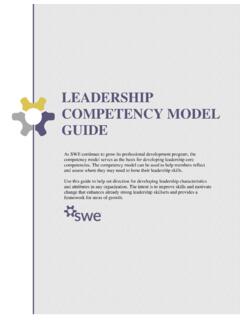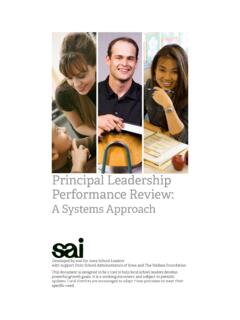Transcription of Successful school leadership - ed
1 Review by Christopher Day and Pamela SammonsSuccessful school leadershipSuccessful school leadershipEducation Development Trust Highbridge House, 16 18 Duke Street, Reading, Berkshire RG1 4RU T +44 (0) 118 902 1000 E W school leadership COPYRIGHT EDUCATION DEVELOPMENT TRUST 2016. THE VIEWS AND OPINIONS EXPRESSED IN THIS PUBLICATION ARE THOSE OF THE AUTHORS AND DO NOT NECESSARILY REPRESENT THE VIEWS OF EDUCATION DEVELOPMENT OF 2014 REPORT 978-1-909437-76-02 Successful school LEADERSHIPC ontentsEducation Development Trust 4 school improvement: international reviews of best practice 5 Executive summary 7 Introduction 8 Defining leadership 11 Doing things right 12 Example of definitions of the role of school leaders in England and links with policy context 13 Models of leadership that promote Successful schools 17 Transformational leadership 18 Pedagogical/instructional leadership 20 Research findings on effective and Successful leadership in English schools 25 International research
2 Perspectives 31 leadership values: ethical/moral leadership 35 New research knowledge about how leaders succeed in different contexts 39 Question 1: What is it about headteacher leadership in schools in the IMPACT study which enabled the school s effectiveness to increase or be sustained over several years in terms of student outcomes? 39 Question 2: How did headteachers in the IMPACT study contribute to sustained school effectiveness? 40 Question 3: What are the differences in the IMPACT study between headteachers in different experience phases, different school sectors, different socio-economic contexts and in schools in different improvement trajectories?
3 41 Question 4: Are there identifiable sequences or patterns of actions taken by incoming headteachers in the IMPACT study? 43 Combining transformational and pedagogical/instructional leadership 45 school development phases 47 The layering of leadership strategies 48 Distributed leadership 51 The effects of distributed leadership 52 leadership trust 54 Enhancing staff motivation and commitment 57 Conclusions 61 References 623 Successful school LEADERSHIPE ducation Development TrustEducation Development Trust.
4 Established over 40 years ago as the Centre for British Teaching and later known as CfBT Education Trust, is a large educational organisation providing education services for public benefit in the UK and internationally. We aspire to be the world s leading provider of education services, with a particular interest in school work involves school improvement through inspection, school workforce development and curriculum design for the UK s Department for Education, local authorities and an increasing number of independent and state schools, free schools and academies. We provide services direct to learners in our we have successfully implemented education programmes for governments in the Middle East, Sub-Saharan Africa and South East Asia, and work on projects funded by donors such as the Department for International Development, the European Commission, the Australian Department of Foreign Affairs and Trade, the World Bank and the US Agency for International Development, in low- and middle-income generated by our operations are reinvested in our educational research visit for more school LEADERSHIPS chool improvement.
5 International reviews of best practiceWorking with partners including the Department of Education at Oxford University, the Centre for Equity in Education at the University of Manchester, the University of Glasgow, the University of Nottingham and the Hong Kong Institute of Education, Education Development Trust has commissioned a series of reviews of international literature. These reviews cover a range of topics related to school improvement including assessment for learning; the inclusion of students with special educational needs; effective teaching practice; school self-evaluation; and Successful school idea that schools can impact positively on student outcomes is a crucial driver in the rise of interest in school improvement research and practice.
6 These reviews highlight international examples of best practice in order to effect change and identify how effective school improvement manifests itself. It forms a useful tool for schools and school leaders, but also acts as a lesson for policymakers in terms of what works around the review focuses on: Successful leadership school leaders are under considerable pressure to demonstrate the contribution of their work to school improvement, which has resulted in the creation of a wide range of literature which addresses leadership in the context of school improvement. This review pays particular attention to issues including transformational leadership , instructional/pedagogical leadership and distributed other four reviews in this series focus on:Assessment for learning Assessment for learning where the first priority is to promote learning is a key means of initiating improvement.
7 The features, strategies and principles underpinning assessment for learning form the basis of this exclusion to inclusion With a specific focus on children with special educational needs (SEN), this review addresses the forms of classroom practice that can help all children to participate. The review particularly focuses on elements of inclusive education and the implications for schools and school teaching Teachers are one of the key elements in any school and effective teaching is one of the key propellers for school improvement. This review is concerned with how to define a teacher s effectiveness and what makes an effective teacher.
8 It draws out implications for policymakers in education and for improving classroom school LEADERSHIPS chool self-evaluation for school improvement school self-evaluation can be a fundamental force in achieving school improvement. This review establishes what the key debates are in relation to school self-evaluation, what principles and processes are associated with it, and what the implications are for school self-evaluation as a means of leading school improvement. The review also incorporates a framework for conducting self-evaluation and case study examples from systems and schools that have previously undergone the Development Trust is a world authority on school improvement.
9 We work directly with schools and governments improving education outcomes through evaluation, training and professional development programmes. This series of reviews fits into our aim to develop evidence for education and supports our goal to provide school improvement programmes which are evidence school LEADERSHIPE xecutive summaryThe evidence examined by this review indicates that effective school leadership is important but, in isolation, is not a sufficient condition for Successful review draws particular attention to two concepts of leadership : instructional/pedagogical and transformational.
10 While there is evidence that instructional/pedagogical leadership has been shown to be important for promoting better academic outcomes for students, it is concluded that the two forms of leadership are not mutually exclusive. A combination of strategies can be most beneficial in ensuring school success and most leadership effects operate indirectly to promote student outcomes by supporting and enhancing conditions for teaching and learning through direct impacts on teachers and their leaders, particularly principals, have a key role to play in setting direction and creating a positive school culture including the proactive school mindset, and supporting and enhancing staff motivation and commitment needed to foster improvement and promote success for schools in challenging challenges facing school leaders include.
















![[STUDENT ACHIEVEMENT FACTORS] - ed](/cache/preview/5/b/7/7/7/3/a/d/thumb-5b7773ad29f4cb9f9299867670f10529.jpg)


